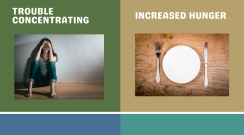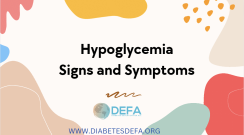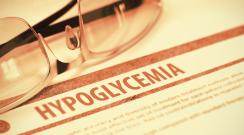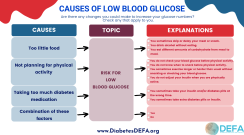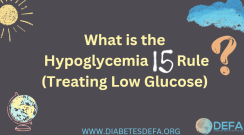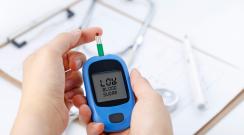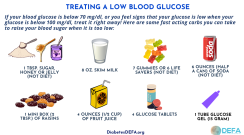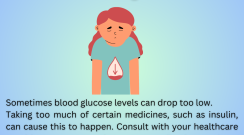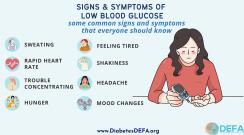Low blood glucose (sugar), or hypoglycemia means your blood glucose is below 70 mg/dL. Risk of low blood sugar is higher in people with diabetes who take insulin or certain pills that may cause low blood glucose if your dose is too high, or you eat less or are more active than usual. Hypoglycemia is more severe when your blood glucose is below 54 mg/dL and can lead to passing out or having a seizure. If you are not able to help yourself, ask for help or call 911 right away. Talk to your healthcare team to get tips on how to know if you have hypoglycemia and ways, you can treat it. Check out these handouts and videos to learn more about it.
- Posted: 02 June 2023
Know if you have signs of low blood glucose (sugar) or hypoglycemia.
Topics: Hypoglycemia
- Posted: 29 December 2022
This short video helps you know if you have signs of low blood glucose (sugar) or hypoglycemia.
Topics: Hypoglycemia
- Posted: 29 December 2022
This short video reviews low blood glucose (sugar) or hypoglycemia and ways to prevent it.
Topics: Hypoglycemia
- Posted: 14 March 2022
5 things that may lead to Low Blood Glucose (Sugar) or Hypoglycemia (Graphic).
Topics: Hypoglycemia
- Posted: 02 June 2023
Low blood glucose (sugar) or hypoglycemia, happens when you take more diabetes medicine than you need, don’t eat enough food or are more active than usual. Talk to your healthcare team about how you can prevent low blood glucose.
Topics: Hypoglycemia
- Posted: 29 December 2022
This brief video about the 15-15 rule to treat low blood glucose (sugar).
Topics: Hypoglycemia
- Posted: 24 March 2022
The ‘15-15 Rule’ is a way to treat low blood glucose (sugar) or hypoglycemia. It means take 15 grams of a fast carb such as half a glass of juice, wait 15 minutes, then check blood glucose again to see if it is above 70 mg/dL.
Topics: Hypoglycemia
- Posted: 02 June 2023
When you have low blood glucose (sugar) or hypoglycemia, eat 15 grams of fast-acting carbs to raise your blood glucose (sugar) to above 70 mg/dL. Here are some 15-gram fast acting carbs ideas you can try.
Topics: Hypoglycemia
- Posted: 02 June 2023
Low blood glucose (sugar) or hypoglycemia is when your blood glucose is below 70 mg/dL. People with diabetes who take insulin or some pills that can cause low blood glucose (sugar) should learn how to prevent it.
Topics: Hypoglycemia
- Posted: 02 June 2023
Low blood glucose (sugar) or hypoglycemia does not always feel the same. This list has what people feel most often when they are low.
Topics: Hypoglycemia
- Posted: 24 March 2022
Hypoglycemia or low blood glucose is when blood glucose (sugar) drops below 70 mg/dL. How you feel when you are low may vary. Watch for these common ones.
Topics: Hypoglycemia
- Posted: 30 January 2023
Watch this video to learn about low blood glucose and how to treat it. Getting your blood glucose at or near goal as often as you can will lower your risk of diabetes problems.
Topics: Diabetes Management

